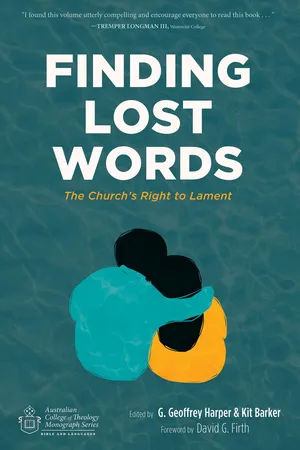![]()
Part I
The History of Lament
![]()
1
Lament Psalms in the Church
A History of Recent Neglect
Rachel Ciano
It is easy to forget. It is easy to forget because most of the time we are not aware we are forgetting. Our thinking drifts slowly away from that which was once so clear, until there is just a blank space or, at best, a sketchy haze of what it was we once remembered so well. For many of us, we fail to recall a time when we used a lament psalm in our church services; we have forgotten to use them. This is the case more broadly across the history of the Western church. In fact, rather than mere passive forgetfulness, the church has often been guilty of more active neglect. As Walter Brueggemann argues above, lament psalms have been neglected in churches because Christians have believed that embracing negativity is an act of unfaith and concedes too much about God’s loss of control. While the tide is slowly turning, and renewed interest in studying and using the lament psalms is resurfacing, what I will present in this chapter is a proposal as to why they were forgotten and neglected in the first place, so that by being aware of this, we may be better prepared to remedy the problem and ensure that it does not occur again.
Lament Psalms and the Church: Early Church to the Reformation
The lament psalms were not always out of vogue. They were used regularly in church services in the Western church in the period up to and including the Reformation of the sixteenth century. In the early church period, references to the use of lament psalms in church services are difficult to find; nevertheless, there is some helpful, suggestive evidence. In the New Testament, churches were commanded to speak and sing psalms when gathered with other believers (Eph 5:19; Col 3:16). Justin Martyr records in his First Apology (c. AD 150) that the Old Testament was read in churches. These readings no doubt included the Psalter. The apocryphal Acts of John and Acts of Paul, while of uncertain origin, nevertheless reflect Christian practices of the mid-second century. In these, mention is made of Christian gatherings including hymns of lament, and the psalms of David in general. Tertullian also makes reference to psalms being chanted in Christian gatherings.
The early church fathers such as Augustine, Jerome, Gregory of Nyssa, and Origen used the lament psalms in their lives, study, and ministry. Augustine provides a helpful model of this. He saw lament as dwelling on present sufferings and eschatological hope concurrently: “Lament for things of the present, sing of what is to come in the future. Pray about what already is, sing about what you hope for.” Augustine preached and wrote on the lament psalms extensively; his collected sermons on the Psalms, Enarrationes in Psalmos, is his largest work. In it, Augustine enticed believers to the Christian practice of lament. His exegesis of the psalms repeatedly insisted that his congregation use the psalms as their own words: “If the psalm prays, you pray; if it groans, you groan.” Augustine also used the lament psalms personally. In Confessions he wrote of being deeply affected and crying when reading the psalms. As he lay dying, Augustine surrounded himself with penitential psalms written out on large sheets of paper hanging on the walls, and he would read them, crying constantly and deeply.
In the Middle Ages, there is clearer evidence—largely because during this period the patterns of corporate worship were better documented—of the lament psalms in use, including instructions on reading, singing, and praying through the entire Psalter on a scheduled, rotational basis. Various monastic orders were at the forefront of this, documenting their heavy emphasis on the psalms in their corporate gatherings. The Benedictine order, which has been called “the most enduring, influential, numerous and widespread religious order of the Latin Middle Ages” is of particular importance in this regard. Benedict instructed his order to sing the whole Psalter through every week as part of their eight church services a day. He even chastised monks who could not achieve this for their extreme laxity of devotion, citing that the church fathers did in one day what he trusts his lukewarm order would accomplish in a whole week! Over time, parish clergy became part of this routine worship practice, and Sunday Vespers (evening services) saw the laity included too. Benedict instructed that Vespers was to include the recitation of at least two lament psalms, Psalm 109 and Psalm 143. The prescribed use of the psalms in the Rule of Benedict was elaborated on in the Carolingian, Anglo-Saxon, and Clunaic reform movements. For example, the Regularis Concordia, part of the Benedictine Reform in England officially sanctioned around AD 973, stipulated that the seven penitential psalms (Pss 6, 32, 38, 51, 102, 130, and 143) were to be recited before dawn (Matins) and at first light (Prime). Thus we find strong evidence of the use of lament psalms in corporate worship attended by monks, parish clergy, and lay people during the Middle Ages.
During the Reformation, lament psalms were used by the church extensively, because the whole Psalter was used extensively. Reformers such as Martin Luther, John Calvin, and Martin Bucer used the lament psalms as the basis of evangelical confession and repentance, which made them a powerful instrument in the Reformation; Luther’s Penitential Psalms (1517) was his first original, published work. Calvin preached on the Psalms every Sunday afternoon from 1547, comple...
